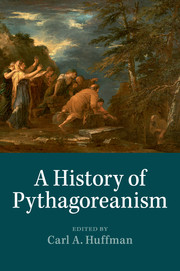Book contents
- Frontmatter
- Contents
- Contributors
- Abbreviations
- Introduction
- Chapter 1 Pythagoras
- Chapter 2 Philolaus
- Chapter 3 Archytas
- Chapter 4 Sixth-, fifth- and fourth-century Pythagoreans
- Chapter 5 The Pythagorean society and politics
- Chapter 6 The Pythagorean way of life and Pythagorean ethics
- Chapter 7 Pythagoreans, Orphism and Greek religion
- Chapter 8 The problem of Pythagorean mathematics
- Chapter 9 Pythagorean harmonics
- Chapter 10 The Pythagoreans and Plato
- Chapter 11 Aristotle on the “so-called Pythagoreans”: from lore to principles
- Chapter 12 Pythagoreanism in the Academic tradition: the Early Academy to Numenius
- Chapter 13 The Peripatetics on the Pythagoreans
- Chapter 14 Pythagoras in the historical tradition: from Herodotus to Diodorus Siculus
- Chapter 15 The pseudo-Pythagorean writings
- Chapter 16 Pythagoreans in Rome and Asia Minor around the turn of the common era
- Chapter 17 Diogenes Laertius’ Life of Pythagoras
- Chapter 18 Porphyry's Life of Pythagoras
- Chapter 19 Iamblichus’ On the Pythagorean Life in context
- Chapter 20 Pythagoras and Pythagoreanism in late antiquity and the Middle Ages
- Chapter 21 Pythagoras in the Early Renaissance
- Bibliography
- General index
- Index locorum
- Greek index
Chapter 18 - Porphyry's Life of Pythagoras
Published online by Cambridge University Press: 05 May 2014
- Frontmatter
- Contents
- Contributors
- Abbreviations
- Introduction
- Chapter 1 Pythagoras
- Chapter 2 Philolaus
- Chapter 3 Archytas
- Chapter 4 Sixth-, fifth- and fourth-century Pythagoreans
- Chapter 5 The Pythagorean society and politics
- Chapter 6 The Pythagorean way of life and Pythagorean ethics
- Chapter 7 Pythagoreans, Orphism and Greek religion
- Chapter 8 The problem of Pythagorean mathematics
- Chapter 9 Pythagorean harmonics
- Chapter 10 The Pythagoreans and Plato
- Chapter 11 Aristotle on the “so-called Pythagoreans”: from lore to principles
- Chapter 12 Pythagoreanism in the Academic tradition: the Early Academy to Numenius
- Chapter 13 The Peripatetics on the Pythagoreans
- Chapter 14 Pythagoras in the historical tradition: from Herodotus to Diodorus Siculus
- Chapter 15 The pseudo-Pythagorean writings
- Chapter 16 Pythagoreans in Rome and Asia Minor around the turn of the common era
- Chapter 17 Diogenes Laertius’ Life of Pythagoras
- Chapter 18 Porphyry's Life of Pythagoras
- Chapter 19 Iamblichus’ On the Pythagorean Life in context
- Chapter 20 Pythagoras and Pythagoreanism in late antiquity and the Middle Ages
- Chapter 21 Pythagoras in the Early Renaissance
- Bibliography
- General index
- Index locorum
- Greek index
Summary
Introduction
For centuries, Porphyry's Life of Pythagoras (Πυθαγόρου βίος, Vita Pythagorae = VP) and Iamblichus’ On the Pythagorean Way of Life have conveyed idealized pictures of Pythagoras that continued to be “canonic” down to the nineteenth century. These two works remain, along with Book 8, §§1–50 of Diogenes Laertius’ Lives and Doctrines of the Eminent Philosophers, the three main sources for scholarly efforts to establish, with great pains and little certitude, a few basic historical facts pertaining to Pythagoras’ life, and, more confidently, to reconstruct the process of the creation of his legend.
It is not a coincidence that, like the two other fully preserved lives of Pythagoras, Porphyry's text comes from the third century AD, a period of (Neo)-Pythagorean revival when interest in Pythagoras was at its peak. Given Porphyry's dates (234 – c. 305 AD), the VP should be placed somewhere between Diogenes (first half of the third century) and Iamblichus (end of the century or early fourth, a few years before or after Porphyry's edition of Plotinus’ Enneads, c. 301), and more precisely after Porphyry's joining the school of Plotinus in Rome in 264 (see below n. 14).
Keywords
- Type
- Chapter
- Information
- A History of Pythagoreanism , pp. 381 - 398Publisher: Cambridge University PressPrint publication year: 2014
- 6
- Cited by

